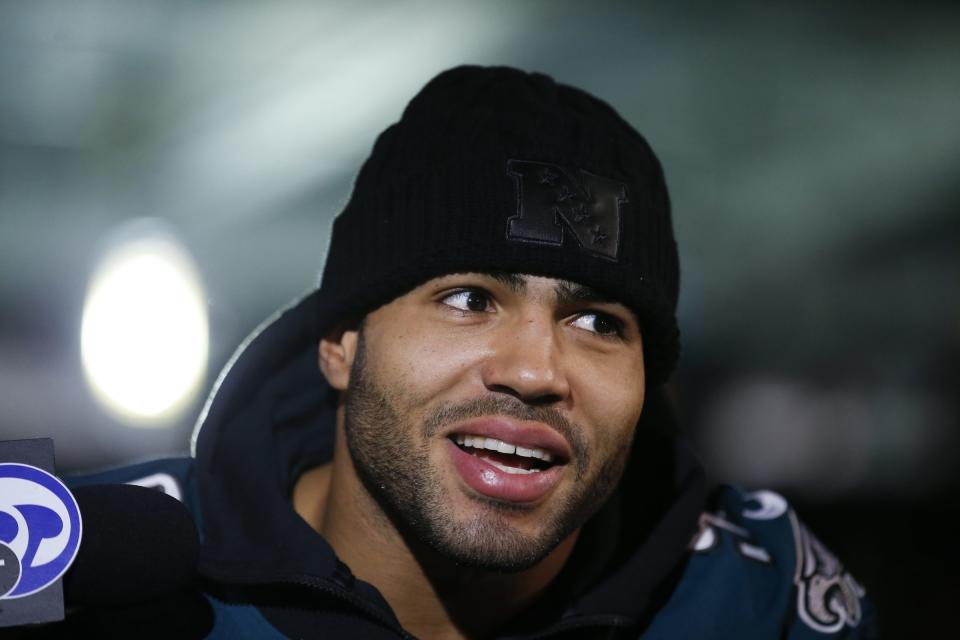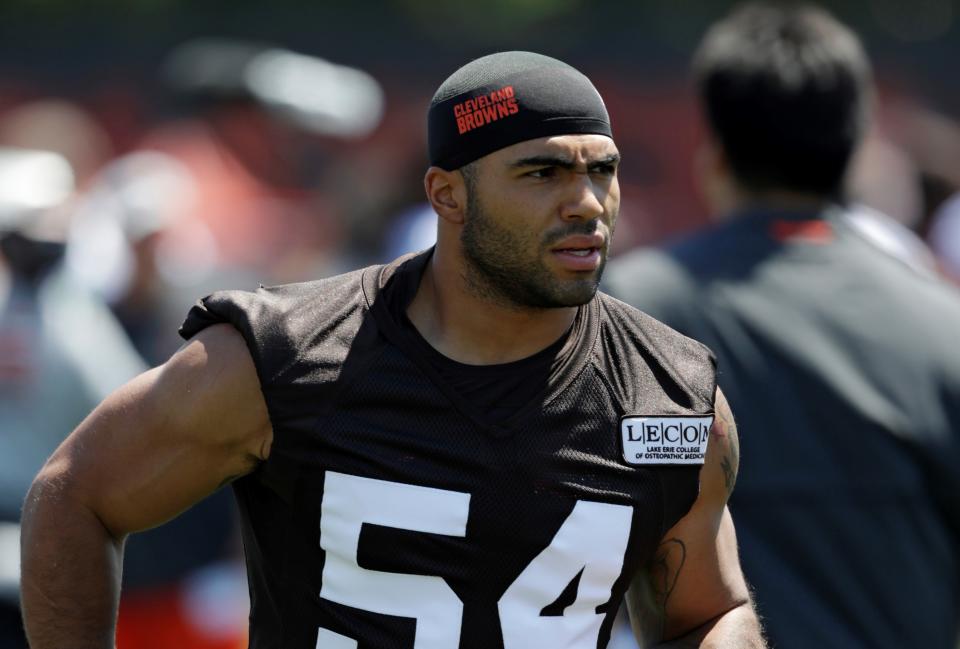Here’s how brazen and aggressive feds say LB Mychal Kendricks was in alleged insider trading scheme
- Oops!Something went wrong.Please try again later.
In an announcement that surprised even some NFL Park Avenue executives, the federal government accused Cleveland Browns linebacker Mychal Kendricks of engaging in a bold insider trading scheme that allegedly transformed $80,000 into $1.2 million in profits over a mere four months.
Now the NFL’s league office is probing Kendricks under the personal conduct policy, in light of federal insider trading charges announced by the Securities and Exchange Commission on Wednesday.
As federal charges go, the ones aimed at Kendricks and former Goldman Sachs investment banker Damilare Sonoiki could have been ripped from the pages of a Hollywood script. Court documents allege a stunningly aggressive scheme with plenty of details, including envelopes of cash, clandestine late-night meetings, coded communications and a staggeringly productive brokerage account that drew the microscope of federal investigators. Ultimately, it culminated in charges of white-collar criminal malfeasance rarely seen among the player ranks in the NFL.
As one NFL Park Avenue executive said of the Kendricks charges Wednesday: “This is a new one.”

Not so much for the SEC, which is tasked with chasing down and prosecuting insider trading schemes – which are often defined by investors manipulating or profiting in financial markets on the basis of confidential information. The allegations laid out against Kendricks and Sonoiki appear to fall squarely in that wheelhouse, with the NFL player allegedly achieving a near 1,500 percent total return on an initial brokerage account investment of $80,000. According to the SEC, that windfall was achieved through options trading on four companies – all of which had advising ties to Goldman Sachs, the global investment bank employing Sonoiki.
“When individuals engage in insider trading … it undermines the public’s faith in our markets and harms ordinary investors who do play by the rules,” said U.S. Attorney William McSwain, whose office announced the charges Wednesday. “As alleged in the criminal information filed earlier today, Mr. Sonoiki and Mr. Kendricks were definitely not playing by the rules. Each has been charged with one count of conspiracy to commit securities fraud and one count of securities fraud.”
McSwain also punctuated one ominous message: “Mr. Sonoiki and Mr. Kendricks are alleged to have cheated the markets, cheated other investors and placed themselves above the law. I want the community to know that the FBI, the SEC and the U.S. Attorney’s office will do everything in our collective power to protect our financial markets and safeguard against insider trading and other kinds of securities fraud. If you commit insider trading or any kind of securities fraud in the Eastern District of Pennsylvania, we will prosecute you to the fullest extent of the law. Your background, your education, your professional success will not save you. It will not matter who you are. It will only matter what you did. And eventually, your crimes will catch up to you.”
Kendricks, who won a Super Bowl with the Philadelphia Eagles last season, released a statement through his attorney accepting responsibility for his role in the scheme and professed remorse for his actions, while appearing to point a finger at Sonoiki. Kendricks added that he is cooperating with the federal investigation.
“I would like to apologize,” Kendricks said. “Four years ago, I participated in insider trading, and I deeply regret it. I invested money with a former friend of mine who I thought I could trust and who I greatly admired. His background as a Harvard graduate and an employee of Goldman Sachs gave me a false sense of confidence.”
The maximum sentence for the counts is 25 years in prison and a $5.25 million fine.
How the alleged scheme came together
The detail in court documents suggest that federal investigators have no shortage of information boxing in the crime – either provided from Kendricks, Sonoiki, other cooperating witnesses or some level of surveillance, digital footprints, forensic audits or other pieces of data left behind by the transactions.
Prosecutors detail a chance meeting between Kendricks and Sonoiki at a party in late 2013, followed by a friendship and exchange of financial ideas through the summer of 2014. It was at that point, according to charging documents, that Kendricks opened up a brokerage account with an $80,000 deposit, which he appeared to have tried to hide from his financial adviser by first transferring the money into his personal checking account and then opening the brokerage account for use by himself and Sonoiki.
Soon after, prosecutors allege that Kendricks’ account began purchasing stock options, taking massive financial gains on four companies that were all headed for stock-spiking merger announcements. All four of the companies – Compuware, Move, Sapient and Oplink – had some level of advisement ties to the investment firm that employed Sonoiki. Prosecutors allege Sonoiki cultivated inside stock pricing information on all four of the companies, using that information so either he, Kendricks or an unnamed “middle man” could purchase stock options that would pay off huge sums following merger announcements.
Among the massive windfalls from those alleged transactions:
Using the initial $80,000 deposited, Kendricks’ brokerage account purchased $60,163 in stock options for Compuware and then sold those options for $138,586 following a merger announcement – a 130 percent return on investment in 34 days.
Kendricks’ account purchased $71,001 in stock options for Move and then sold those options for $349,702 following a merger announcement – a 393 percent return on investment in 25 days.
Kendricks’ account purchased $145,784 in stock options for Sapient and then sold those options for $634,862 following a merger announcement – a 335 percent return on investment in 31 days.
Kendricks’ account purchased $446,387 in stock options for Oplink and then sold those options for $798,260 following a merger announcement – a 79 percent return on investment in 24 days.
During the timeframe of stock trades, federal investigators detailed text exchanges between Kendricks and Sonoiki that appeared to show a willful attempt to cover their actions, speaking in coded texts or on FaceTime, meeting face-to-face and eventually employing a “middle man” to manage the brokerage account. Prosecutors haven’t identified the middle man who at one point handled the brokerage account for Kendricks and communicated with Sonoiki. The middle man also isn’t listed in charging documents as a co-conspirator in the scheme, despite having some level of involvement.
The court documents go on to detail alleged kickbacks and gifts from Kendricks to Sonoiki, which included roughly $10,000 in cash, tickets to Eagles games and a visit to a music video shoot. There are also text exchanges that recount some level of anxiety from Kendricks over the scheme, with Sonoiki attempting to quell his reservations or reminding him to avoid certain types of communication. However, the documents also reveal that late in the middle of the scheme, the online firm hosting the brokerage account placed a freeze on funds due to suspicious login activity. Following that freeze, prosecutors detail a “desperate” call from Kendricks to the online brokerage firm, pleading for the freeze to be lifted in advance of another round of options purchases.
In one of the more colorful coded text exchanges, Sonoiki also allegedly references one of the cash kickbacks he expected from Kendricks, using the “bread” in Philly cheesesteaks:
“idk when next imma be able to see you,” Sonoiki allegedly texted Kendricks “so try to have the bread if you can … the bread in nyc just isn’t the same and I really like my cheesesteaks with the stuff you all have in Philly.”
In totality, the charging documents appear to show a detailed account of the scheme, and a participation and knowledge by Kendricks that went beyond finances. That might explain why Kendricks and his attorney have quickly admitted guilt publicly and remorsefully, as they attempt to get ahead of an apparently inevitable guilty plea to some level of charges. What court documents don’t detail is how and when the SEC became aware of the crime – or why it took the federal government years to ultimately bring charges. All of that, it seems, will be fleshed out as the case moves into a courtroom.
What is clear: Prosecutors are holding Kendricks responsible as a co-conspirator for the insider trading that occurred – either by willful ignorance or active participation. Sonoiki has not returned messages seeking comment, but his employment at his firm came to an end in 2015. It’s unknown if that departure was related to the insider trading federal investigation.

What does this mean for Kendricks’ NFL career
Without knowing the full details of what has transpired between Kendricks’ lawyers and federal prosecutors, it’s hard to know what this will mean for his NFL future. But Kendricks’ public statements are those of someone who is working to mitigate his guilt. That alone suggests prosecutors have an ample amount of evidence involving the scheme.
The Browns spent Wednesday gathering facts before cutting Kendricks – with general manager John Dorsey saying the team was originally told that Kendricks was a victim of a financial “situation” in 2014.
“Prior to signing Mychal, we were informed that there was a financial situation that he had been involved with in 2014,” Dorsey’s statement said. “We were told Mychal had fully cooperated with investigators as a victim. From what was communicated at that time and based on the numerous questions we asked and further due diligence on our part, including checking with the league office, there was no information discovered that conveyed otherwise.”
A league source told Yahoo Sports that Kendricks will be investigated under the personal conduct policy, which means the NFL could suspend him if it has ample evidence of guilt. How Kendricks’ own statement of guilt could impact that is unknown, but it puts the onus on the NFL to react to a player who has been charged with a scheme and already admitted some level of culpability.
More from Yahoo Sports:
• Dan Wetzel: Twitter meltdown means Ohio State headaches not over
• Charles Robinson: Ex-NFL star’s remarkable tale of redemption
• Browns linebacker charged with insider trading
• Kevin Iole: Hand-wrapping controversy hangs over Canelo-GGG rematch

